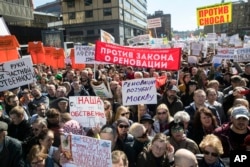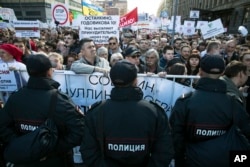Thousands of Moscow residents protested this month against plans to move more than a million people if their apartments, built during the 1950’s era of Soviet leader Nikita Khrushchev, are torn down.
Russian authorities say some 8,000 short-story buildings are in disrepair, and promise to find or build the residents better apartments. While some living in crumbling buildings celebrate, many Muscovites are skeptical and suspect corruption.
Families like Elmira Shagiakhmetova’s have lived in their home for generations. They are shocked that it may be demolished.
“I’ll be here until the bulldozers start,” says Elmira. “I am not going to leave as by the (Russian) Constitution I have the right to stay in my property. This building is not falling apart.”
Family home
For Elmira and her mother, Galina, their modest but recently-refurbished two bedroom apartment is a home full of memories. “We moved here in ’79 and it’s the place where my children were born, lived and their conscious experience started,” says Galina. “It’s my history and my memory.”
Galina moved out some years ago and her husband passed away. But the apartment is still their family home.
“When my father was still alive we celebrated his 50th birthday,” says Elmira describing the scene as she sits in the same living room. “So many people came to congratulate him that we couldn't find seats for them all in one room. So the tables continued into the corridor. And I remember this because then I understood how important it was to have a home that would hold all your friends together.”
Public uproar
After a public uproar, Moscow guaranteed the residents better apartments in the same areas or 'appropriate' financial compensation. City authorities removed about half the buildings from a demolition list, including Elmira’s, and say they now will be razed only if more than two-thirds of residents agree. Those living in Elmira’s building are to take a vote at the end of May.
But, like many Muscovites resisting the plan, Galina and Elmira suspect corruption as their building was not even inspected before its supposed need for demolition was announced. “You know, a special commission should work and declare the building dangerous to live in,” says Galina. “We have not seen such a commission ever here. So by many indications we may judge that it is not the people who are most important, but the location.”
Elmira agrees. “The draft (law) that's debated now is not about improvement of the living conditions, it's about overriding the rights of property owners,” she says. “It allows the authorities to get the land on which the houses stand free and to strip off the owners of their right to own and defend their property.”
No comment
The Moscow mayor’s office did not respond to VOA’s request for a TV interview with a spokesperson on the issue or written replies to submitted questions.
Russian media reports quoted Moscow Mayor Sergei Sobyanin saying he was prepared to take unpopular moves if he felt it was best for the city and people.
Russia’s parliament is still drafting the final legislation for the Moscow renovation plan. Russian President Vladimir Putin has said the law should not violate property rights or he would not sign it.
For families like Elmira’s, the controversy has moved them - for the first time - to protest against the state. If authorities fail to satisfy Russians in the capital, they risk growing opposition at the polls in next year’s key presidential and mayoral elections.
Ricardo Marquina Montanana contributed to this report.










